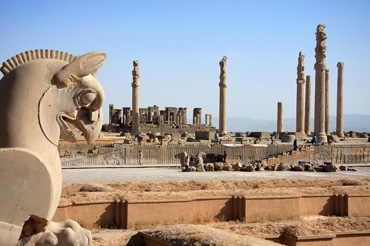Learn to Speak Persian
In Tutorial by Mohammad Habibi .
Persian is a language almost as beautiful as its region of origin. Unique, poetic and influential, Persian opens the door to one of the most distinctive Middle Eastern cultures.
In this article, you’ll discover many more reasons to consider Persian for your next foreign language project – as well as few myths about its supposed difficulty. I'll also highlight a few of its features and quirks, and provide some starting points for learning Persian (known to native speakers as Farsi) yourself.
Let’s start by looking at two common mistakes about Persian…
Mistake 1: Persian is Only Spoken in Iran
I once believed that learning Persian would be pointless because of the limited opportunities to use it. Nothing could be further from the truth.
As well as its widespread use in the Middle East, Persian is still used throughout the Iranian diaspora, which is enormous. Practically every major city in the Western world has a strong Iranian community thanks to waves of migration during the 20th century.
Here in the UK, for example, I can wander around West London and pick out Iranian grocery stores, restaurants, jewellers, travel agents and barbers. There are also strong communities in Paris, Vancouver, Sydney, and New York. Los Angeles and Toronto are such hotspots that they’ve earned the nicknames ‘Tehrangeles’ and ‘Tehranto’ among Iranians.
This means that you’re unlikely to have to visit Iran itself to find native speakers to practice with… unless you really want to.
Mistake 2: Iran is Really Dangerous
Many people (especially in the US) believe that Iran is a part of the world to be feared and avoided. This is a misguided view, as I've discovered on numerous extended visits to the country.
In fact, it’s inspired me to make a film in order to show Iran in precisely the opposite light, as a place full of incredible landscapes, diverse cultures and hospitable people. (Click here to watch the film and see what I mean.)
My first visit to Iran was in 2008, when I couldn’t speak a word of Persian outside سلام / salaam (hello) and خیلی ممنون / kheyli mamnoon (thank you very much). But in 2013, after learning a few introductions and some basic grammar and vocabulary, I spent two months of language immersion travelling alone in Iran. I met native speakers by Couchsurfing in the cities, hitch-hiking between them. I also crammed new vocabulary by using Anki flashcards in every spare moment.
The people I met were so warm that I was never left alone (even when I wanted to be alone!). By the end of the trip, I was speaking entirely in Persian from one day to the next, and had made many friends to whom I’d never spoken a word of English. After years of failed language learning in the past, these two months were a revelation.
Good Reasons To Learn Persian
Travel is not the only reason to learn a language, of course. There’s also art, literature, music, film, and more. Persian cultural expression over the centuries has given birth to some of the most famous philosophical literature and romantic poetry ever written in any language.
Rumi, Saadi, Hafez, Ferdowsi, and Omar Khayyam are ancient Persian writers who command respect among the English speaking world, as well as being revered by modern-day Iranians. Many Iranians of can quote you any number of verses by rote. Imagine the pleasure of being able to read the work of these writers in its original language. It’s especially pleasurable because Persian is a fluid language that lends itself well to artistic expression.
In Persian, unlike English, today’s literary form of the language hasn’t changed for centuries. A modern speaker can still read and understand an original text written a thousand years ago.
There’s modern culture too. Iran’s film scene in particular is intensely strong. With the Hollywood staples of sex and violence banned, filmic artistry through dialogue and story has flourished. Iranian director Asghar Farhadi recently won the Best Foreign Language Oscar for his film A Separation.
Beginner Tips For Learning The Perso-Arabic Alphabet
When you don’t know the first thing about Persian script, a sentence such as اَز آشِنایی با شُما خوشوَقتَم – az aashnaayee baa shomaa khoshvaght-am – looks like a load of squiggles and dots. But… so would ‘I’m pleased to meet you’ if you didn’t know the Latin alphabet – which is exactly what the phrase above means in Persian.
Good luck! موفق باشی!
1 comment
majid amiri